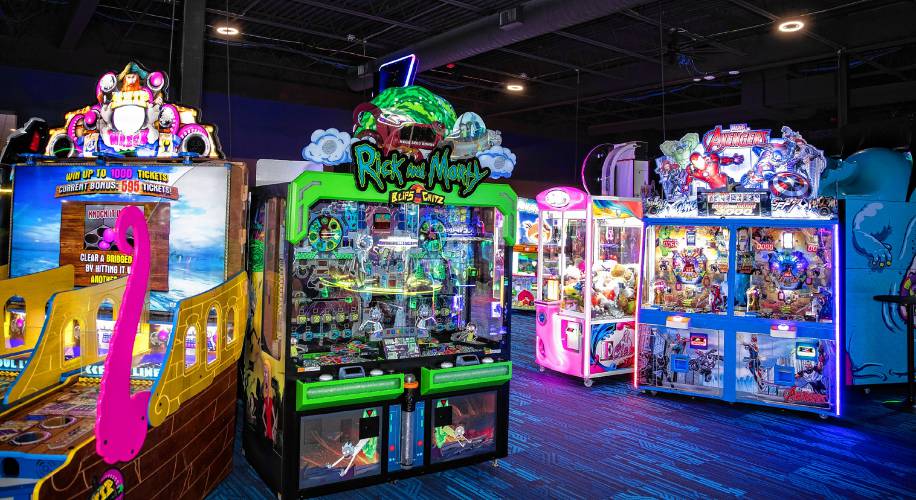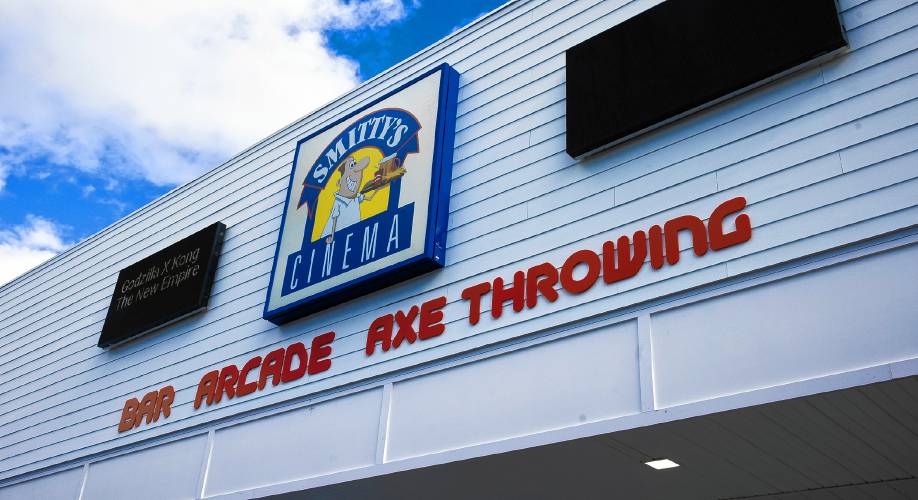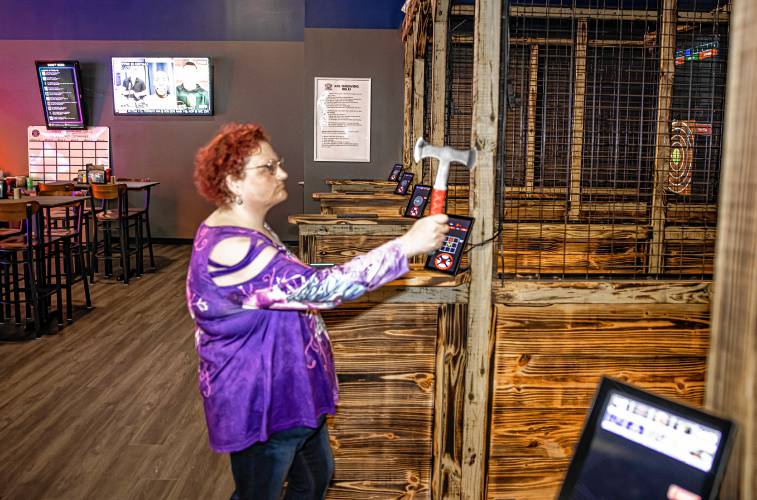With Concord down to one movie theater, is there a future to cinema-going?
|
Published: 04-25-2024 1:10 PM
Modified: 04-25-2024 5:21 PM |
With Concord reduced to a single movie theater for the first time in living memory and New Hampshire chain Chunky’s Cinema Pub closing two of its three locations, going out to the flicks in the Granite State just keeps getting harder.
Don’t expect that to change any time soon.
“It would be an understatement to say it’s a really tough business environment for movie theaters,” said Albert Waitt, president of operations for Smitty’s Cinema, which has four sites including one in Tilton. The chain now offers live entertainment including ax-throwing as well as first-run movies. “With so much competition in entertainment, existing as a movie theater is a real challenge.”
The recent closing of the Regal next to Steeplegate Mall leaves the nonprofit Red River Theatres as the only place showing movies in Concord. That is quite a change for a city that from the 1930s through the 1980s had as many as three indoor cinemas – the Concord Theater, Star Theater and the Capital – plus two drive-ins, and later had two multiplexes on Loudon Road.
We’re not just a one-movie-house town now, we’re a one-movie-house region.
You have to travel a dozen miles to Hooksestt, Manchester or Tilton to find another cinema and if you’re driving west you’ll have to go clear to Claremont or Keene before you can see “Godzilla vs. Kong” on the big screen.
In another blow to New Hampshire film lovers, Chunky’s Cinema Pub, which brought us the idea of dining while watching movies when it opened in 1993, will shut its Nashua and Pelham theaters in early May, leaving only the Manchester site that opened in 2017.
Like Smitty’s, Chunky’s now hosts events such as live comedy, dinner parties and Bingo nights.
Article continues after...
Yesterday's Most Read Articles
 Federal government to appeal New Hampshire judge’s ruling on legal status of Dartmouth international student
Federal government to appeal New Hampshire judge’s ruling on legal status of Dartmouth international student
 AROUND CONCORD: Your guide to free summer music
AROUND CONCORD: Your guide to free summer music
 Warner shot down a housing developer’s bid. New statewide zoning mandates could clear a path for proposals like it.
Warner shot down a housing developer’s bid. New statewide zoning mandates could clear a path for proposals like it.
 ‘There’s tradition up here’ – Morrill Farm approaches its centennial, celebrates evolution and growth
‘There’s tradition up here’ – Morrill Farm approaches its centennial, celebrates evolution and growth
 How fast will NH’s universal school choice program grow?
How fast will NH’s universal school choice program grow?
 New Hampshire home prices hit an all-time record high amid housing shortage
New Hampshire home prices hit an all-time record high amid housing shortage
“About half of our business comes from non-theatrical releases,” said Michael Mannetta, marketing director for the company. The Nashua and Pelham theaters have had a harder time drawing crowds for these events, he said. That’s partly a reflection of the fact that expanding from movies to events isn’t as easy as it sounds.
“It’s a difference customer base, requires launching a different campaign that speaks to different people. It’s a very, very complex business,” said Mannetta.
But it’s necessary, he said, because of a change in the movie business.
“Around 2007-8 we started noticing a change in the industry. It became very blockbuster driven,” Mannetta said. Previously big movies were scattered throughout the year, aiming for school vacation, Memorial Day, 4th of July and other holidays: “It was like monkey bars, you can swing to the next one. The releases – bang, bang, bang – carry you.”
But “the gaps started getting larger” between big releases and fewer people were coming out for other movies. Combined with a shortening window before theatrical movies moved online to streaming services, this forced the change in business practices, he said.
Other movie closings in the state in recent years include the Derry Five Star Cinema, which became a warehouse, the Regal Cinema in Hooksett, which is a Harley-Davidson dealership, and a former Cinemagic in Portsmouth that is being converted to housing.
New Hampshire is not alone, of course. The number of theaters in the U.S. has fallen by more than one-quarter since 1995, a decline that shows no sign of slowing, as streaming at home has increasingly replaced viewing films in a public theater.
The Regal closing is part of a national pullback by the country’s second-largest chain of cinemas while AMC, the biggest chain, has barely escaped bankruptcy. While total box office returns have rebounded from the depths of the pandemic shutdown, they have become heavily dependent on a relatively small number of very successful movies like “Barbie” or “Top Gun: Maverick,” leaving few of the mid-level films that theaters need to stay open week after week.
That challenge is why half of the eight screens at the Smitty’s in Tilton are now home to other activities.
“We have become an entertainment center. That makes us more diversified and not dependent solely on movies, as we were,” Waitt said. Two other of Smitty’s four cinemas have also been similarly converted and the fourth is about to change, as well.
The theater still shows first-run films with food delivered to your table, as it always has, but that’s no longer its sole offering.
“We’re doing live comedy, we’re doing karaoke, paint-and-sip nights, dueling pianos. We’re doing as much alternative content as we can fit, not only because it makes money but it creates that entertainment hub,” said Waitt. “It used to be people would ask ‘What’s playing at the movies?’ Now we’re hoping it’s ‘What’s going on at Smitty’s? Maybe there’s a comedian there, or Rockstar Bingo.’
“We have to evolve in this environment,” he said.
One of the biggest evolutions in local film-going happened in 2007 when Red River opened its doors as the region’s first membership-focused, nonprofit movie house, one that wasn’t dependent on ticket and popcorn sales alone. It has become a cornerstone of downtown since then and now faces a business world in which it’s the last man standing.
“For Red River the closing of Regal means we will have more opportunities to screen more traditionally mainstream movies but that doesn’t mean that we will book anything and everything. We will continue to curate films for our audiences and keep our indie spirit in how we operate. We are still limited by only having two large auditoriums so scheduling will always be a challenge,” wrote Angie Lane, executive director.
“Red River Theatres still remains a small nonprofit that will not exist without community support. (Regal’s) closure in no way guarantees our future.”
On a hopeful note, Lane looked back at the 1990 opening of Steeplegate Mall, which like the adjacent Regal will be torn down and turned into a mixed-used development, as a possible parallel.
“It was a time when the independent stores on Main Street felt the threat of the Steeplegate Mall and vacant storefronts were common. Over time, with investment, Main Street has destroyed the Mall,” she wrote.
“Concord supports an indie bookstore, indie music store and an indie theater. Our community has shown that they value the personal, real life experience of shopping locally. … I am hopeful that people will continue to want to experience movies in movie theaters but we are experiencing a cultural shift. Times like this require organizations and businesses to adapt and it requires us to be patient, flexible and creative.”















 Canterbury honors ‘real heroes’ with updated Military Veterans’ Project
Canterbury honors ‘real heroes’ with updated Military Veterans’ Project Look, up in the sky! It’s… an Airstream trailer?
Look, up in the sky! It’s… an Airstream trailer? Around Concord: Over The Moon Farmstead brings mead, beer, pizza and music to Pittsfield
Around Concord: Over The Moon Farmstead brings mead, beer, pizza and music to Pittsfield Around Concord: The Balshaws bring a rustic revival to the Canterbury Country Store
Around Concord: The Balshaws bring a rustic revival to the Canterbury Country Store
